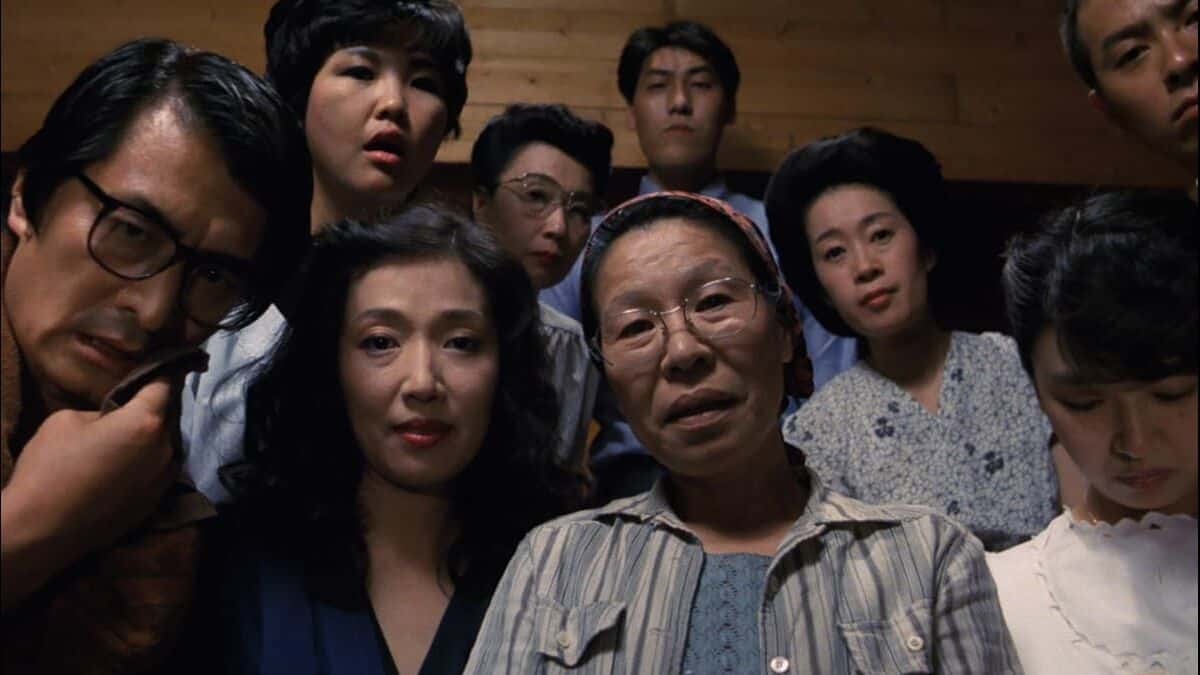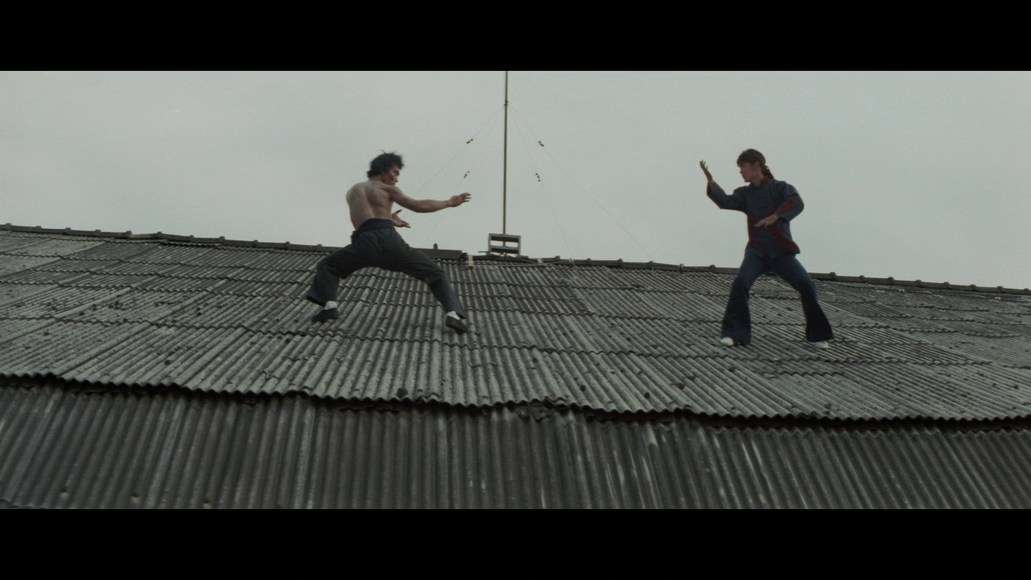Cinematic and Psychological Interfaces
Before leaving the “Game Trilogy”, I would like to touch on two moments in which the cinematic technology fused with psychological aspects of either the Narumi character, the Matsuda persona, or both. The first occurs in “The Killing Game”, concerning the voice.
And this would be a good place to address the elephant in the room: Shohei Narumi is no hero – not even an anti-hero. He is a monster. His treatment of women ranges from the abominable to the criminal. Of course, Matsuda also plays monsters in the two other films Murakawa directed him in: “The Resurrection of the Golden Wolf” (1979) and “The Beast to Die” (1980). But those monsters clearly prey on the non-criminal populace and they are single films. With three films in which Narumi battles impossible odds, achieves his aims, and eludes the deadlier complexities of the games rigged against him, it is easier to lose sight from time to time of how despicable he is.
In her legendary essay, “Narrative Cinema and Visual Pleasure,” Laura Mulvey described the gendering of the heterosexual male spectactor through the modes of visual pleasure the Hollywood film offers him: the woman's body as erotic spectacle, and object of desire; and the male protagonist – the agent of the narrative as a point of identification. Several feminist film makers such as Yvonne Rainer, Chantal Akerman, and Sheila McLaughlin have devised strategies to disrupt such identification. And Rainer Werner Fassbinder's films also deliberately alienate the viewer, in reaction against the legacy in German cinema of the fascination of the fascist spectacle.
I am, of course, not suggesting that Murakawa was concerned about Mulvey's spectatorship model. But I am suggesting that independently of any presumed directorial intentions, “The Game Trilogy” at times provides an opportunity for the spectator to confront habits of identification and even modes of address in the films that might elicit such responses. One in particular occurs after a particularly brutal moment in “The Killing Game”, in the scene in Katsuda's warehouse in which he allows one of his henchman wearing brass knuckles to repeated punch Narumi in the throat (Fig 23).

Despite the agony of that beating, Narumi manages to escape, and he goes to the apartment of Katsuda's mistress, Misako, played by Yutaka Nakajima, who starred in the Sonny Chiba Street Fighter films. At first she closes the door in his face, but when he collapses on the staircase, she puts him to bed and tends to his throat (Fig. 24).

She would have been perfectly justified in leaving him outside. They met five years earlier when he took her hostage after he committed a hit in front of her. The only reason she survived, was because instead of shooting her immediately, he played Russian roulette with her and her luck held (Fig. 25), an incident shown again as a brief memory as Narumi begins to seduce her.

During his seduction, the bandage around his throat underscores his silence, now a physical inevitability, but resonate with Narumi's typical withdrawn demeanor with women (Fig. 26).

But then Yusaku Matsuda's voice comes over the soundtrack, singing plaintively, and expressing feelings that Narumi never does. This division is an opening for spectatorial (and aural) alienation from Narumi's crimes, a check on identification. As Misako and Narumi make love, Yusaku sings (Fig. 27):
“The sun grows dim/ marking the end of summer . . .
I want to apologize, but I falter, unable to continue . . .
The crimes I inflicted on you
Are filigreed elegantly across your body
There is only one actor left on stage
He plays a younger me
. . . in my volatile days
Eruptions bewilder me . . .”

Memory.
The above scene in “The Killing Game” divided the Matsuda personae into silent character and disembodied voice. In The Execution Game, there is a scene that integrates memory and the event it preserves.
Before he had been captured and thrown into the dungeon in the first scene, Narumi had been with a singer (Lily) whom he had met in a bar. They spent the night together, and although the next day, he assured her she was right in assuming it had been a one-night stand, the pair walk on the beach and share stories about their past and wishes from their youth (so out of character for Narumi). But the idyll doesn't last long when the singer's car is forced into a forest where she seems unconscious against the steering wheel as Narumi is drugged and dragged away.
Even as he was recovering from the hand wound and preparing for the next contract, Narumi needed to find out what happened to the woman. Her memory haunted him and he kept fondling a cassette tape in his pocket like a talisman. At one point he returns to the bar where she was singing. The bartender pours him a bourbon as Narumi had that night, and tells him the singer had never returned. Alone, Narumi, pulls the cassette out of his pocket and drinks (Fig. 28).

Suddenly the site of the memory is subsumed by the memory. Narumi turns to see the woman at the piano singing as if to him. When the song concludes, she sits next to him and he offers her a drink. Recognizing how intently he was watching her, the singer initiates the following conversation, which seems to occur simultaneously in the time of the original event and the time of the present memory:
“Have you heard this song before?”
“Yes, once.”
“Does it bring back a memory?”
Narumi denies it, but he could easily have said, “Yes, it brings back this memory that we are both in again.” (Fig. 29)

In this moment, the film (which is a technology of memory) is remembering itself. The experience comes back through the memory as if closing over an injury prematurely, so that the wound will never heal properly.
Memories Beyond the Game
In “The Game Trilogy”, neither Narumi's past nor his memories beyond that of the singer are ever divulged. In “A Homansu”, the protagonist's memories are completely foreclosed. It is tempting to draw an analogy to the situation discussed in Part One, between the screen figures without a past and Yusaku Matsuda's suppressed past as the child of a Korean woman. And conversely, other analogies could be drawn between the mystery of Yusaku Matsuda the actor, and the films in which his character suffers from the burdens of the past.














I have viewed The Game Trilogy multiple times and most of the other films you mentioned. Your Zones of Terror analogy for The Game Trilogy resonates in particular, and I like your comments about the time and scene dissonances and the memory on memory elements of the trilogy.
Narumi is indeed a monster, but he lives in a world of monsters greater than himself. He plays by the rules of the game: he takes the contract and he fulfills it as best he can. It is the monsters greater than himself who interfere with, abruptly change or violate the rules. Those monsters are engaged in organized crime, violence and corruption that affects Japanese society as a whole. Nurumi is not killing innocent, ordinary citizens. He doesn’t attack or kill any of the mahjong players who he suspects of cheating, even when they seriously beat him or later for revenge. Narumi stays within the rules of the game, including payback for those who violate the rules.
It’s not a secret Japanese society has long been male-oriented and male dominant. Whether we agree with that or not, the Trilogy was filmed 45 years ago when those attitudes were still relatively unchallenged. And the majority of the women Narumi deals with in the Trilogy are not innocent: they are duplicitous, scheming accomplices of organized brutal crime.
I appreciated your comments about the correspondence between Narumi, the man without a history, and Yusaku Matsuda’s own personal history. An actor with silenced history playing a character with no history. Was that coincidence? I think not. Both the director and Matsuda had to be fully alert to that element. Certainly in the Trilogy, Narumi’s lack of back story is a magnet that pulls our focus and interest in the character more effectively than the inclusion of any back story in the film would.
Thanks for this series on Yusaku Matsuda. I look forward eagerly to the next installment.
thank you, Link. I really appreciate the depth and engagement of your reading.